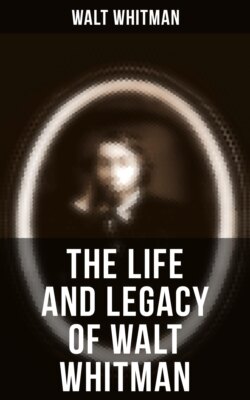Читать книгу The Life and Legacy of Walt Whitman - Walt Whitman - Страница 66
На сайте Литреса книга снята с продажи.
UNION PRISONERS SOUTH
ОглавлениеTable of Contents
Michael Stansbury, 48 years of age, a seafaring man, a southerner by birth and raising, formerly captain of U. S. light ship Long Shoal, station'd at Long Shoal point, Pamlico sound—though a southerner, a firm Union man—was captur'd Feb. 17, 1863, and has been nearly two years in the Confederate prisons; was at one time order'd releas'd by Governor Vance, but a rebel officer re-arrested him; then sent on to Richmond for exchange—but instead of being exchanged was sent down (as a southern citizen, not a soldier,) to Salisbury, N. C., where he remain'd until lately, when he escap'd among the exchang'd by assuming the name of a dead soldier, and coming up via Wilmington with the rest. Was about sixteen months in Salisbury.
Subsequent to October, '64, there were about 11,000 Union prisoners in the stockade; about 100 of them southern unionists, 200 U. S. deserters. During the past winter 1500 of the prisoners, to save their lives, join'd the confederacy, on condition of being assign'd merely to guard duty. Out of the 11,000 not more than 2500 came out; 500 of these were pitiable, helpless wretches—the rest were in a condition to travel. There were often 60 dead bodies to be buried in the morning; the daily average would be about 40. The regular food was a meal of corn, the cob and husk ground together, and sometimes once a week a ration of sorghum molasses. A diminutive ration of meat might possibly come once a month, not oftener. In the stockade, containing the 11,000 men, there was a partial show of tents, not enough for 2000. A large proportion of the men lived in holes in the ground, in the utmost wretchedness. Some froze to death, others had their hands and feet frozen. The rebel guards would occasionally, and on the least pretence, fire into the prison from mere demonism and wantonness. All the horrors that can be named, starvation, lassitude, filth, vermin, despair, swift loss of self-respect, idiocy, insanity, and frequent murder, were there. Stansbury has a wife and child living in Newbern—has written to them from here—is in the U. S. light-house employ still—(had been home to Newbern to see his family, and on his return to the ship was captured in his boat.) Has seen men brought there to Salisbury as hearty as you ever see in your life—in a few weeks completely dead gone, much of it from thinking on their condition—hope all gone. Has himself a hard, sad, strangely deaden'd kind of look, as of one chill' d for years in the cold and dark, where his good manly nature had no room to exercise itself.
